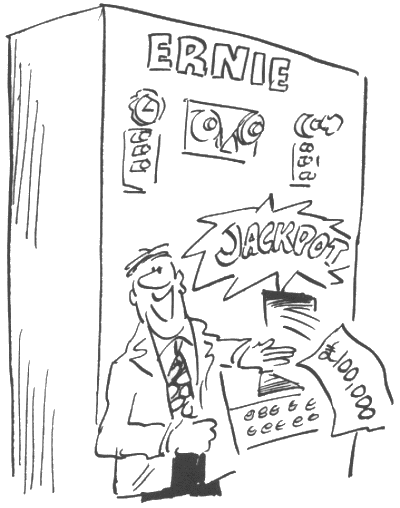Ernie
The Ernie Game
The Results
Number Choice
|
 |
Premium Bonds - Ernie
The Government uses random numbers to pick
winning premium bonds. Premium bonds cost £1. You
can sell them back at any time and get your £1 back.
Prizes are awarded each month. The top monthly prize
in 1979 was £100,000. The top weekly prize was £75,000.
The prizes must be given fairly. Each £1 bond must
have an equal chance of winning a prize. This is how it
is done.
A computer called Ernie prints out random numbers. Ernie stands for `Electronic Number
Indicator Equipment'. The Bonds with these random
numbers win prizes.

|
a |
Do you think the method of choosing prize winners is fair? |
|
b |
The same bond cannot win two prizes in the same
month. If the bond is chosen twice, it only gets the
higher of the two prizes. Is this fair? Is it likely to
happen? |
|
c |
Should you be allowed to choose your own
premium bond numbers?
What difference would it make? |
The Ernie Game
The class will work in 10 groups. Each group will need two score sheets and 10 counters.
Outline
Each counter is worth £1. You can use the counters to
buy premium bonds. The bonds are numbered 0-99.
Each month there are prizes worth £10 altogether.
Groups take it in turns to buy all their bonds. All the
bonds are sold. Groups keep their bonds for 10 turns.
At each turn random number tables give the winning
bond numbers. The group with the most money at the
end wins. There are 17 prizes each turn (month)
| Prize value |
|
| Number of prizes |
|
Table 7 - Prizes from Ernie
How to Play: Buying the Bonds
| 1 |
Each group decides how it is going to choose its numbers (e.g. the 10 smallest available numbers). |
| 2 |
Put the groups in order (use a fair method). |
| 3 |
The first group decides which bonds to buy. They
pay for their bonds with counters, and the teacher
marks on his chart the numbers they have bought.
They write their numbers in the space on their shore
sheets. |
| 4 |
The second group chooses its numbers from those
left in the same way. The teacher marks off these numbers on his sheet, and they write the numbers
on their sheets. |
| 5 |
The other groups take their turns to buy their
bonds. The last group has no choice. They take the
last ten numbers. |
Finding the Winners
| 1 |
The teacher reads out the 17 winning numbers. The
first 10 each win 10p, the next four 50p, the next two
£1 and the last one £5. |
| 2 |
One member of each group records the winning
numbers in order on his score sheet. |
| 3 |
Another member of each group puts a tick on his
score sheet where his group's bond wins a prize. |
| 4 |
Each group works out how much prize money it has
won that month. |
| 5 |
Each group keeps its own bonds. The teacher reads
out the 17 numbers for the next month's winners. |
| 6 |
Repeat until there have been 10 months. |
| 7 |
Add all the prizes for the 10 months and write it in
the space on the score sheet. The group with the
most money wins. |
The Results
In the Ernie game, 100 bonds worth £100 were sold.
Each month the prizes were worth £10. In 10 months
£100 worth of prizes were given. There were 10 groups.
We would expect each group to finish with about £10
prize money.
Some groups had rules to help them choose bond
numbers. Other groups had little choice.
|
a |
How did you choose your numbers? |
|
b |
Did you win more than £10? |
|
c |
Were your numbers successful? |
|
d |
Do you think successful numbers will go on being
successful? |
|
e |
Did the group who chose first win the most money? |
|
f |
Does it matter which numbers you choose? |
|
g |
Your teacher used random numbers to choose prize
winners. Is this fair? Give a reason. |
Number Choice
Here are some rules for choosing numbers. Use the
prize-winning numbers in your Ernie game to see how
well they work.
|
a |
Ann likes numbers in order. She buys bond
numbers:
10, 11, 12, 13, 14, 15, 16, 17, 18, 19
How much would she have won in your Ernie game?
What could she expect to win?
Is it better to buy numbers in order? |
|
b |
Brian likes prime numbers. He buys bond numbers:
7, 11, 13, 23, 29, 37, 41, 43, 61, 71
How much would he have won?
Is it better to choose prime numbers? |
|
c |
Charles prefers even numbers. How much money
did even numbers win? Were even numbers better
than odd numbers? Would this always be true? |
|
d |
Check some other rules. For example, you could try
square numbers, big numbers, multiples of 9, and so on. |
|